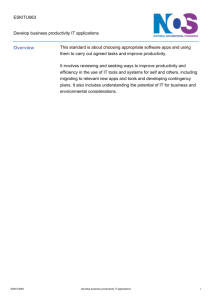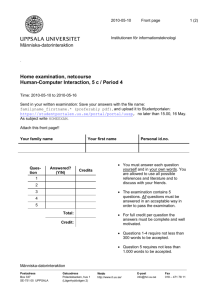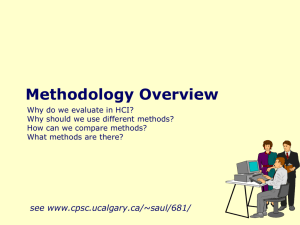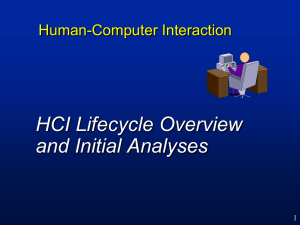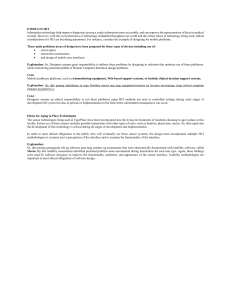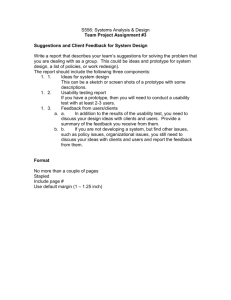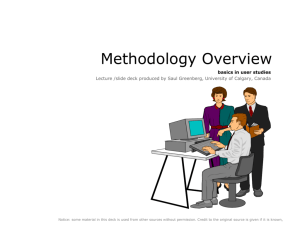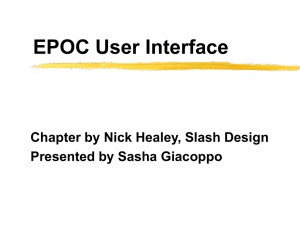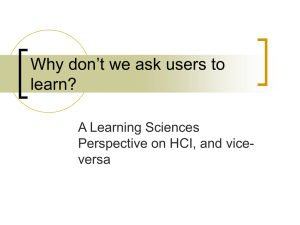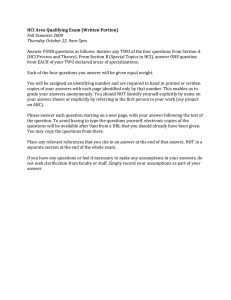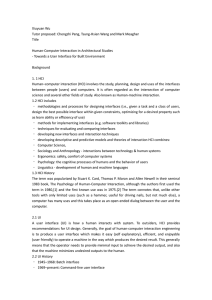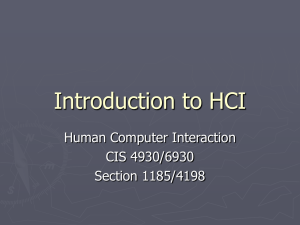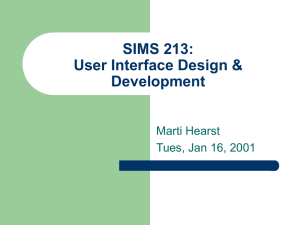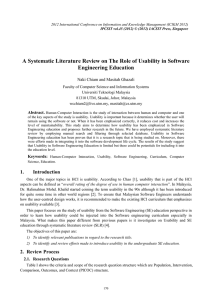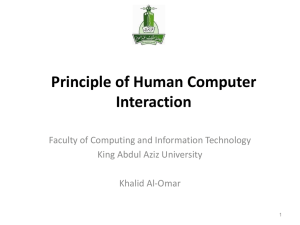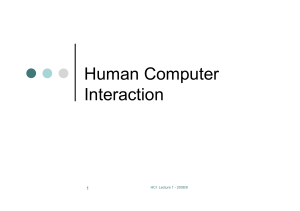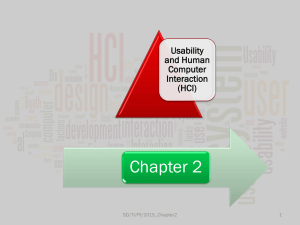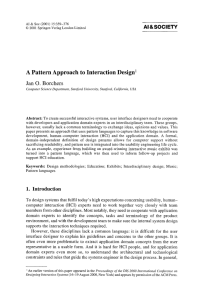National Skills Academy Network
advertisement
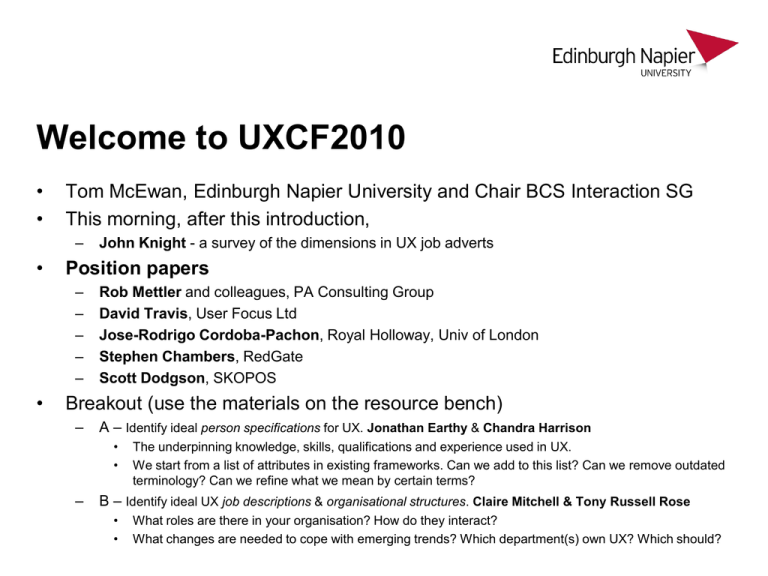
Welcome to UXCF2010 • • Tom McEwan, Edinburgh Napier University and Chair BCS Interaction SG This morning, after this introduction, – • Position papers – – – – – • John Knight - a survey of the dimensions in UX job adverts Rob Mettler and colleagues, PA Consulting Group David Travis, User Focus Ltd Jose-Rodrigo Cordoba-Pachon, Royal Holloway, Univ of London Stephen Chambers, RedGate Scott Dodgson, SKOPOS Breakout (use the materials on the resource bench) – A – Identify ideal person specifications for UX. Jonathan Earthy & Chandra Harrison • • – The underpinning knowledge, skills, qualifications and experience used in UX. We start from a list of attributes in existing frameworks. Can we add to this list? Can we remove outdated terminology? Can we refine what we mean by certain terms? B – Identify ideal UX job descriptions & organisational structures. Claire Mitchell & Tony Russell Rose • • What roles are there in your organisation? How do they interact? What changes are needed to cope with emerging trends? Which department(s) own UX? Which should? Welcome to UXCF2010 (part 2) • After lunch (supplied) – Chandra Harrison chairs and presents a survey (By UPA UK) of existing UX occupations and salaries • Position papers – – – – – William Hudson, Syntagm Susan Turner & Phil Turner, Edinburgh Napier University Phil Day & colleagues, NCR Corporation Mitja Koštomaj, Thames Valley University Alison Black, Alison Black Researching & Consultancy • Breakout groups – how to make progress in each case • Final Session – chaired by Nigel Bevan • Break for food (not supplied) then reconvene at RSE Rationale • Why have we got the UK’s finest UX experts all gathered in this room? • Employment is now regimented by definitions of competency – – – – – Due to equal opportunities and employment protection legislation Comparable pay for comparable jobs etc The need to benchmark our skills against other countries To automate HR (see HR-XML now v3) To automate skills gap analysis • HCI/Usability/UX are basically nice people – We don’t elbow our way into the standards – Too busy doing the job to play the strategy games? – Get 37 of us in a room and get 75 different definitions of UX? Yet we have been making progress for 20 years • • • • Charles Brennan Jonathan Earthy Nigel Bevan And many, many more – see the HCI Educators paper • UX-related roles in SFIA v3 (2005) and SFIA v4 (2008) – – – – 4 core human factors roles 6 other core roles (IOHO) ~25 other roles that support or relate to UX Out of 78 total IT roles • Ccskills (Design) and Skillset (Interactive Media) also cover UX space • Then again what about Marketing, Financial Services etc • Today we start the process for the next round of standards Common ideas about UX roles and jobs • UX is the result of a combination of individual roles plus an evolution of an organisational culture. • The existing well known roles of Usability Evaluation, Usability Engineer or Cognitive Engineer are in most definitions of the UX team • Several papers highlighted that Interaction Designers and Prototype Engineers were also part of the UX team (there was a wide range of other roles mentioned, however). Common ideas about UX knowledge/skills • Business & organisational: – – • General knowledge from the field of marketing – – • Professional communication skills – in particular the ability to create effective visual summaries of complex issues and action lists/trade offs Expertise in negotiation, consultancy and project management Specific techniques and methods: – – – – • The ability to present and exert influence within large organisation, in particular the ability to raise UX awareness/maturity levels in organisation The ability to “deliver” in projects, covering a range of viewpoints, from being a pragmatic completer-finisher, to someone who ensures no details are neglected Techniques and methods from ethnography or anthropology A knowledge of Experiential Design and other contemporary participative design approaches Expertise in evaluation techniques and processes A detailed understanding of usability, in particular as defined by ISO standards Innovation: – – The ability to apply theoretical knowledge to novel and unexpected areas Expertise in rapid development methods and research techniques in the context of product development processes. National Skills Academy Network • • • • • • • • • • • • • • Construction Creative and Cultural Skills (initially for ‘backstage’ and ‘offstage’ roles in theatre and live music events) Enterprise Financial Services Food & Drink Manufacturing Hospitality Breaking news IT Skills Academy vision: IT to produce Manufacturing “highly skilled, Materials, Production & Supply multidisciplinary technology Nuclear professionals who Process Industries understand how business Retail works and can confidently Social Care manage projects, systems Sport & Active Leisure and people” Basic roles • • • • • Pre-Entry / Junior Technician Associate Professional Professional Senior Professional Lead professional IT & Telecoms NOS (e-Skills 2009) • “Pre-Entry / Junior Technician Role: – Competence (4.3.J.1) – Carry out, under supervision, specified human needs analysis activities – Competent performance requires Understanding (4.3.J.1.U.) of: • a) what needs to be considered when analysing human needs – is meant by a user experience – is the range of available communication methods and media, both electronic and non electronic and their appropriateness for meeting the needs of consumers and/or organisations • b) the importance of undertaking investigations such as interviewing, observation and questioning during human needs analysis” • ...and on p54 g) Assist (the APs) in documenting the required user experiences © Copyright e-skills UK Sector Skills Council Ltd 2000-2009 Page 53 of 566 IT and Telecoms NOS Approved Sep 09 • (P61) Professional Role: • Competence (4.3.P.1) – Manage, under supervision, information to direct human needs analysis assignments • a) Correctly identify and use business requirements and the required user experiences, so that they can be reflected in human needs analysis assignments, under direction • ....the importance of: – accurately and completely representing the business requirements for the user experience in the HCI design • Competence (7.2.P.2): Monitor and report on the effectiveness and customer satisfaction of ‘Service Help Desk and Incident Management’ activities (p359) John Knight • PROVES
